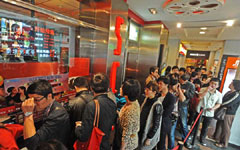Dramatic cuts threaten China's theater companies
(Xinhua) Updated: 2014-03-26 15:47CHANGCHUN - Theater companies in China are in difficulties as the nationwide frugality campaign starts to bite.
"We used to have around 40 shows a year, but last year the number reduced to about 10 and our revenue plummeted," said Zhang Hao, head of the Jilin Symphony Orchestra Troupe in Northeast China.
Fewer performances in governments and State-owned enterprises, who were major clients of arts troupes before, have cut revenue dramatically.
|
 |
|
 |
Arts troupes used to rely heavily on the government which accounted for about 70 percent to 80 percent of their total income, said Li Zhuang, head of the Jilin Opera Troupe, which has a staff of 48.
About half their revenue usually came during the Spring Festival, the busiest season, as many institutions used to organize celebratory events, but this year, the anti-extravagance drive put paid to all that.
Companies must now shift their focus to ordinary citizens to get box office, said Li. "There will be a painful period, but in the long run it will be good for the troupes."
In the past decade, cultural reforms have forced arts enterprises to get by on their own. The Jilin Song and Dance Troupe, founded in 1954, turned itself into a limited company in 2010.
Since December 2012, the company has been holding regular shows in Changbai Mountain Theater in the province's popular tourist area. These shows guarantee the income for more than 100 performers and the troupe could make 10 million yuan a year, said Liu Chunmei, chair of the troupe.
The way forward is better shows and finding other channels of income like dance schools and dress rental, she said.
Performance revenue declined everywhere last year, including Beijing. The total revenue and audience of Beijing's 123 performance venues fell by 5 percent and 7.8 percent respectively in 2013, according to the Beijing Trade Association for Performances. The frugality campaign was one of the main factors in the decline.
With shrinking cultural consumption by the government, companies must rely on the public, said Liu.
"We must change our thinking, search for new markets and attract citizens with quality work," said Li.
- NHTSA says finds no 'defect trend' in Tesla Model S sedans
- WTO rare earth ruling is unfair
- Amway says 2014 China sales may grow 8%
- President Xi in Europe: Forging deals, boosting business
- CNOOC releases 2013 sustainability report
- Local production by Chery Jaguar Land Rover this year
- Car lovers test their need for speed in BMW Mission 3
- China stocks close mixed Monday

















